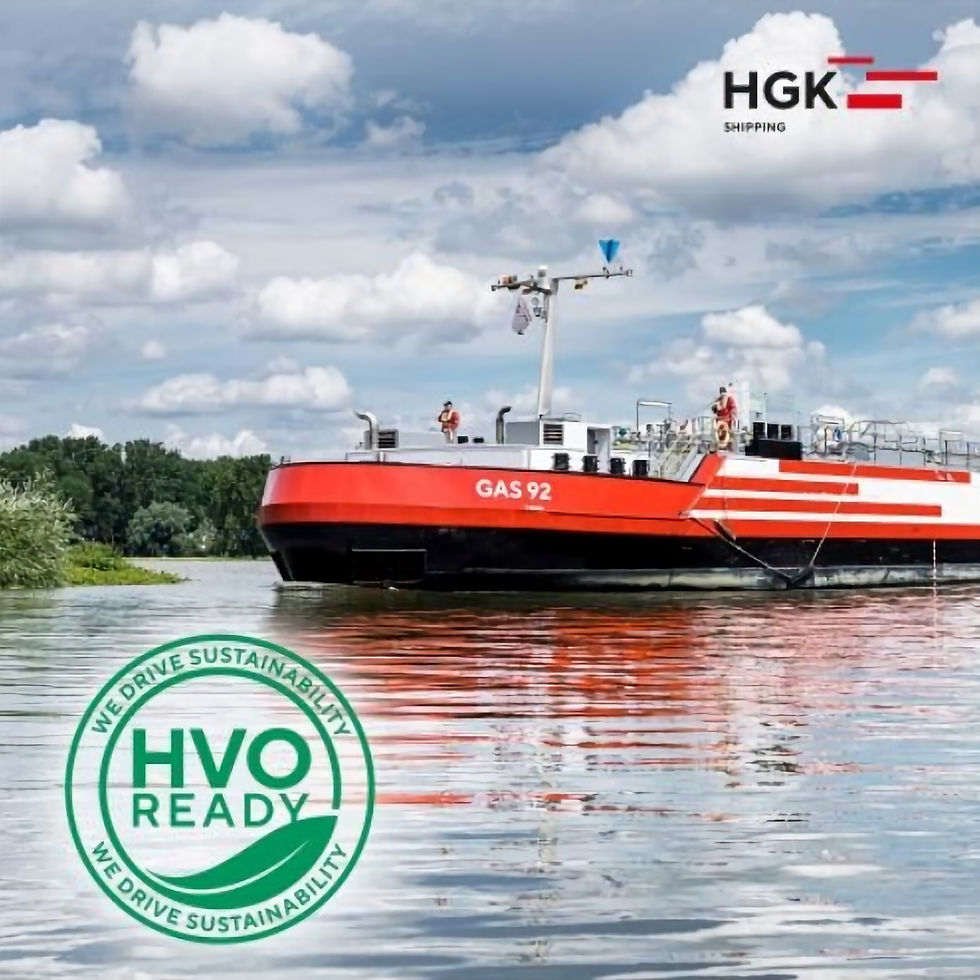HGK Shipping welcomes German government’s approval of 100% renewable diesel, calls for tax relief to lower price
- HGK Shipping
- Apr 12, 2024
- 3 min read

HGK Shipping announced April 10 its support of the German government’s decision to approve 100 percent hydrotreated vegetable oil (HVO100), also known as renewable diesel.
HGK Shipping noted that while the alternative fuel is more climate friendly than petroleum diesel fuel, it is currently still more expensive.
At the same time, Europe’s largest inland-waterway shipping company said it believes that this provides an opportunity to move forward with decarbonizing this mode of transport in the medium term.
European inland-waterway shipping companies face high investment costs for new drive systems for vessels.
Thus, it said the approval of HVO100 by the government has come at the right time.
After all, the sector—with its approximately 13,000 vessels—is not large enough for the manufacturers to be able to initiate or call for appropriate developments in this field.
The relatively advanced age of the fleets also rules out switching the engines, which are powered by fossil fuels, to alternative drive concepts—for example using ammonia, methanol and hydrogen—in a cost-effective way in the short term.
The necessary infrastructure is also missing in these fields.
HGK Shipping said it believes that fueling vessels with HVO can therefore represent a sensible interim solution for inland-waterway shipping.
However, the company is calling for subsidies for the increased costs of the fuel until market mechanisms have regulated the price for HVO100 to match the level of traditional diesel.
By fully using this biogenic fuel and achieving the associated reductions in CO2 emissions, soot particles and nitrogen oxides, this mode of transport could be almost climate-neutral by 2030, according to the market leader’s prediction.
Steffen Bauer, CEO of HGK Shipping, has issued the following comments regarding the launch of the fuel across Germany.
“The go-ahead provided by the government in Berlin for its use is an important incentive for mobility in Germany—and this also applies to inland waterway shipping, which is very climate friendly anyway,” Bauer said. “That’s why we’re going to use HVO100 straightaway. This fuel could already significantly minimize CO2 emissions in comparison with traditional fossil fuels and represents a viable transitional measure during a phase when emission-free drive technologies are still in the development stage. In light of the costly research expenditure for innovative types of engines and the economically unrealistic scenario of quickly and extensively equipping older existing fleets with new ship engines, resource-efficient transport logistics will already become a reality now thanks to HVO100.”
Due to their long service life, inland-waterway vessels—unlike most of their ocean-going counterparts—will still be in service when further legal requirements to reduce CO2 emissions come into force.
“We’re asking politicians to consider introducing a sector solution and creating the relevant incentives for this biogenic fuel to be used across the board within inland-waterway shipping,” Bauer explained. “Short-term tax relief, which would be necessary for as long as it takes for the price of HVO to match the costs of diesel fuel, would significantly promote the use of this interim solution. Alongside this, subsidies for research and development work in the field of fuel-cell technology should be made available on a long-term and targeted basis. This would create the conditions for modernizing fleets, which are already 55 years old on average, from sustainability points of view too. Inland-waterway shipping could then grow with planning certainty and be assured of a good future—it could support this important mode of transport to be able to significantly reduce its CO2 emissions during the next few years to benefit the planned energy revolution.”
HGK Shipping has already purchased quotas of the biofuel to be able to exclusively operate parts of its fleet with HVO100 in the future.
No technical modification is necessary to use the fuel, which is obtained from nonfossil sources, even for fairly old drive systems.
This therefore opens the possibility for the sector to make further use of older shipping fleets without any significant investments and still make an important contribution to decarbonizing European inland-waterway shipping by achieving savings of up to 90 percent in its CO2 emissions.


































